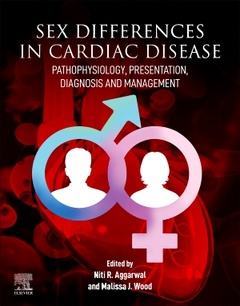Sex differences in Cardiac Diseases Pathophysiology, Presentation, Diagnosis and Management
Coordonnateurs : Aggarwal Niti R., Wood Malissa J.

Sex Differences in Cardiac Disease provides a timely review of the contemporary data on these sex-specific differences in pathophysiology, clinical presentation, diagnostic evaluation, and management of cardiovascular diseases that fills a void for clinicians in practice and training. With contributions from renowned experts in the field and guideline writers, the text provides a state-of-the-art review of each topic encompassing the full spectrum of CVD in men and women. Sex-specific guideline-based recommendations are highlighted when available. Tailored to meet the needs of the busy clinicians and researchers, this text provides concise practical data to care for men and women at risk for or with CVD. The book serves as an essential resource for researchers, cardiologists, obstetricians, gynecologists, internists, family practitioners, nurse practitioners and physician assistants, and respective trainees who treat men and women with CVD.
1. Introduction: Past, Present, and Future of Heart Disease in Men and Women
Section II: Epidemiology and Prevalence
2. Epidemiology and Prevalence
Section III: Ischemic Heart Disease
3. Prevention of Cardiovascular Disease
4. Acute Coronary Syndrome
5. Spontaneous Coronary Artery Dissection
6. Interventions in Ischemic Heart Disease
7. Stable Ischemic Heart Disease
8. Coronary Microvascular Dysfunction
9. Myocardial Infarction with Nonobstructive Coronary Disease
Section IV: Heart Failure
10. Heart Failure with Reduced Ejection Fraction
11. Heart failure with Preserved Ejection fraction
12. Pulmonary Arterial Hypertension
13. Takotsubo Syndrome
14. Peripartum Cardiomyopathy
Section V: Valvular Heart Disease
15. Valvular Heart Disease
Section VI: Arrhythmias
16. Atrial Fibrillation
17. Ventricular Arrhythmias
18. Role of ICD and CRT
Section VII: Vascular Disease
19. Peripheral Arterial Disease
Section VIII: Congenital Heart Disease
20. Congenital Heart Disease
Section IX: Pregnancy-Related Heart Disease
21. Pregnancy and Cardiovascular Disease
22. Unique Features of Cardiovascular Pharmacology in Pregnancy and Lactation
Section X: Cardiac Disorders Unique or More Specific to Women
23. CardioRheumatology
24. CardioOncology
25. Sex Hormones and Their Impact on Cardiovascular Health
Section XI: Psychological Health in CVD
26. Psychosocial Issues in Cardiovascular Disease
Section XII: Pharmacotherapy Considerations in Men and Women
27. Cardiovascular Medications
Section XIII: Current Challenges, Opportunities and Next Steps for Clinicians
28. Disparity in Care Across the CVD Spectrum
29. Women’s Heart Programs
Malissa J. Wood, MD, FACC, is an Associate Professor of Medicine at Harvard Medical School where she serves as the Co-director of Massachusetts General Hospital Heart Center Corrigan Women’s Heart Health Program, and the Cathy E. Minehan Chair of Cardiovascular Disease in Women. Dr. Wood is the Principal Director of the Massachusetts General Hospital Spontaneous Coronary Artery Dissection Registry and is a member of Steering Committee of the International Spontaneous Coronary Dissection Registry (iSCAD). Dr. Wood is also the Governor of the Massachusetts American College of Cardiology Chapter. She is the author of numerous manuscripts, chapters and reviews addressing cardiovascular disease in women as well as development of effective approaches designed to address diversity in cardiovascular medicine. Dr. Wood is also the author of two books, Smart at Heart and Thinfluence.
- Provides a comprehensive state-of-the-art text written by internationally renowned experts in the field of CVD disease, serving as an indispensable resource for clinicians and researchers
- Enables the reader to understand the sexual dimorphism in the pathophysiology, diagnosis, management, and outcomes of the full spectrum of cardiovascular issues including ischemic heart disease, valvular disorders, arrhythmias, and heart failure
- Provides a concise evidence-based practical review of medical topics, with key points and eye-catching visual infographics to meet the needs of the busy clinicians, policy makers and researchers
Date de parution : 01-2021
Ouvrage de 720 p.
21.4x27.6 cm
Thèmes de Sex differences in Cardiac Diseases :
Mots-clés :
Sex Differences; Cardiovascular Disease; Risk factors; proposed pathophysiology; presentation; treatment; Ischemic Heart Disease; hypertension; Recognition; clinical presentation; non-invasive imaging; invasive testing; Microvascular disease; Acute coronary syndromes; Spontaneous coronary artery disease; Myocardial infarction with no obstructive coronary disease; Heart Failure; Stress induced Cardiomyopathy; Peripartum Cardiomyopathy; Valvular Heart Disease; mitral regurgitation; Arrhythmias; Ve



